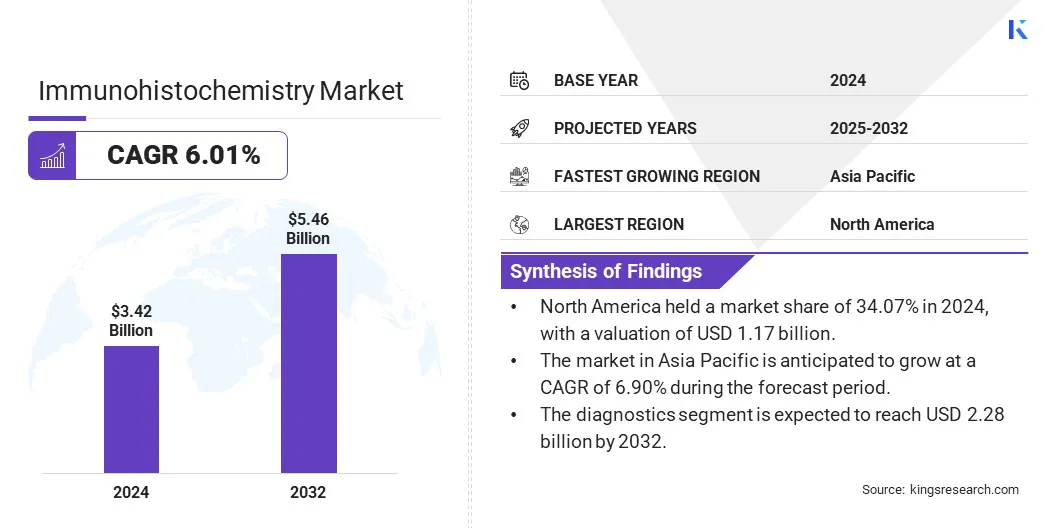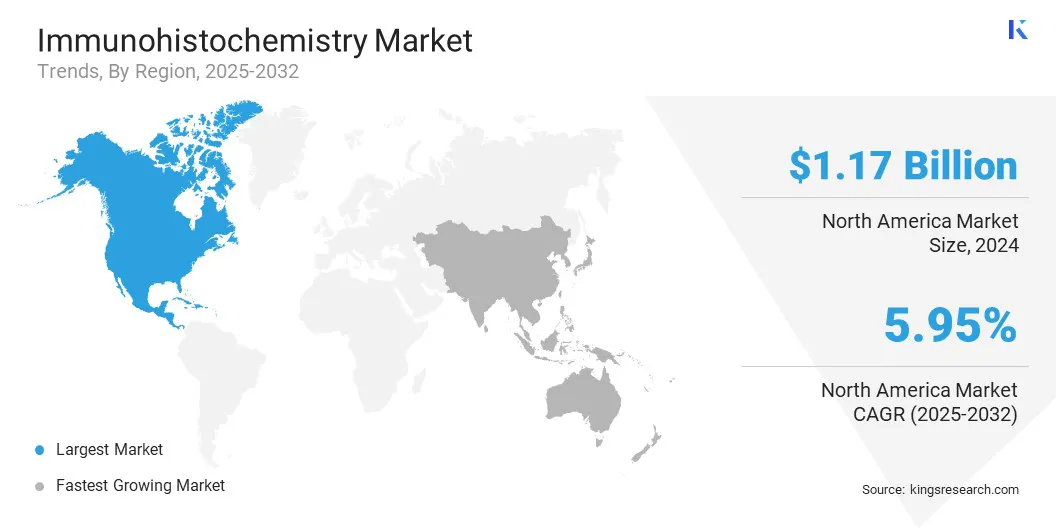Market Definition
The market comprises products and services used to visualize cellular components in tissue samples through antigen-antibody interactions. Key components include antibodies, detection reagents, staining systems, and imaging equipment.
The market covers diagnostic, research, and forensic applications, primarily in pathology, oncology, and drug testing. It serves hospitals, diagnostic laboratories, pharmaceutical firms, and research institutions, with clearly defined boundaries around histological tissue analysis using immunological labeling techniques.
The report provides a comprehensive analysis of key drivers, emerging trends, and the competitive landscape expected to influence the market over the forecast period.
Immunohistochemistry Market Overview
The global immunohistochemistry market size was valued at USD 3.42 billion in 2024 and is projected to grow from USD 3.63 billion in 2025 to USD 5.46 billion by 2032, exhibiting a CAGR of 6.01% during the forecast period.
The rising cancer incidence and advancements in targeted therapies drive the demand for precise tumor profiling through advanced immunohistochemistry techniques, enhancing diagnostic accuracy and enabling personalized treatment plans in oncology.
Major companies operating in the immunohistochemistry industry are Thermo Fisher Scientific Inc., Agilent Technologies, Inc., Bio-Rad Laboratories, Inc., Biocare Medical, LLC, Sino Biological, Inc., Leinco Technologies, NICHIREI BIOSCIENCES INC., Enzo Biochem Inc., Genemed Biotechnologies, Inc., BIOTEM SAS, Labotronics Scientific, OriGene Technologies, Inc., Roche Diagnostics, North America, Zytomed Systems GmbH, and Abcam Limited.
Rising healthcare expenditure significantly accelerates the market by driving investments in advanced diagnostic solutions. Increased funding enhances research capabilities, enables adoption of cutting-edge technologies, and supports expanding pathology services.
Healthcare systems prioritize precision diagnostics to improve patient outcomes, fueling the demand for immunohistochemistry in disease detection and personalized treatment planning. This financial momentum fosters innovation, expanding the market landscape.
- According to the Organization for Economic Co-operation and Development (OECD), public health spending is expected to increase at an average annual rate of 2.6%, outpacing the 1.3% growth in government revenues across member nations. The total health expenditure, including necessary investments for future health system resilience, could reach 11.8% of GDP by 2040.

Key Highlights:
- The immunohistochemistry market size was valued at USD 3.42 billion in 2024.
- The market is projected to grow at a CAGR of 6.01% from 2025 to 2032.
- North America held a market share of 34.07% in 2024, with a valuation of USD 1.17 billion.
- The antibodies technology segment garnered USD 1.32 billion in revenue in 2024.
- The diagnostics segment is expected to reach USD 2.28 billion by 2032.
- The hospitals & diagnostic laboratories segment secured the largest revenue share of 40.43% in 2024.
- The market in Asia Pacific is anticipated to grow at a CAGR of 6.90% during the forecast period.
Market Driver
Rising Cancer Prevalence Accelerates Demand
The rising incidence of cancer significantly accelerates the demand for advanced diagnostic solutions, propelling the market. Increased cancer prevalence mandates precise tumor classification and biomarker detection, enhancing the adoption of immunohistochemistry techniques.
Healthcare providers prioritize early, accurate diagnostics to improve treatment outcomes, driving investments in histopathology infrastructure and innovative antibody-based assays across clinical laboratories, hospitals, and research institutions.
- In February 2024, the International Agency for Research on Cancer (IARC) released new figures on the global cancer burden, emphasizing its increasing prevalence, unequal impact on disadvantaged groups, and the pressing need to reduce disparities in care. Data from 2022 revealed approximately 20 million new cases and 9.7 million deaths. Around 53.5 million people were alive within five years of a cancer diagnosis. Cancer affects about 1 in 5 people during their lifetime, with roughly 1 in 9 men and 1 in 12 women dying from the illness.
Market Challenge
Shortage of Skilled Workforce in Immunohistochemistry
One of the key challenges in the immunohistochemistry market is the shortage of skilled professionals capable of accurately interpreting complex IHC results. This talent gap can lead to diagnostic errors and reduced test efficiency, limiting the clinical utility of IHC in precision medicine.
Manufacturers are integrating Artificial Intelligence (AI) and Machine Learning (ML) algorithms into IHC platforms to support pathologists with automated image analysis. Additionally, companies are investing in training programs and partnering with academic institutions to build a more skilled workforce and ensure accurate diagnostic outcomes.
Market Trend
Advancements in Immunohistochemistry Shaping Cancer Therapy Diagnostics
The market is adapting to advancements in cancer therapies. The prevalence of targeted treatments and immunotherapies is increasing the emphasis on precise tumor profiling through immunohistochemistry tests.
The focus is on utilizing new biomarkers for better tumor characterization, improving diagnostic accuracy, and enabling more personalized treatment plans. This shift is prompting the development of more advanced immunohistochemistry platforms tailored to meet the evolving needs of oncology diagnostics.
- In November 2024, Tempus AI launched its Immune Profile Score (IPS) test for adult patients with stage IV and metastatic pan-solid tumors eligible for immune checkpoint inhibitor therapy. Validated in 1,600 patients, IPS demonstrated prognostic value independent of tumor mutational burden, PD-L1 immunohistochemistry (IHC), and microsatellite instability status.
Immunohistochemistry Market Report Snapshot
|
Segmentation
|
Details
|
|
By Offering
|
Antibodies (Primary, Secondary), Reagents & Kits (Histological stains, Blocking Sera and Reagents, Chromogenic Substrates, Fixation Reagents, Stabilizers, Organic Solvents, Proteolytic Enzymes, Diluents), Equipment (Slide Staining System, Tissue Processing Systems, Slide Scanners, Others)
|
|
By Application
|
Diagnostics, Research, Forensics
|
|
By End Use
|
Hospitals & Diagnostic Laboratories, Research & Academic Institutes, Others
|
|
By Region
|
North America: U.S., Canada, Mexico
|
|
Europe: France, UK, Spain, Germany, Italy, Russia, Rest of Europe
|
|
Asia-Pacific: China, Japan, India, Australia, ASEAN, South Korea, Rest of Asia-Pacific
|
|
Middle East & Africa: Turkey, U.A.E., Saudi Arabia, South Africa, Rest of Middle East & Africa
|
|
South America: Brazil, Argentina, Rest of South America
|
Market Segmentation:
- By Offering (Antibodies, Reagents & Kits, Equipment): The antibodies segment earned USD 1.32 billion in 2024, due to the increasing demand for precise and specific diagnostic tools, advancements in antibody production technologies, and their pivotal role in cancer research and personalized medicine.
- By Application (Diagnostics, Research, Forensics): Diagnostics held 42.13% share of the market in 2024, due to the growing need for accurate, early detection of diseases such as cancer and infections, along with the increasing adoption of immunohistochemistry techniques in clinical diagnostics for personalized treatment plans.
- By End Use (Hospitals & Diagnostic Laboratories, Research & Academic Institutes): The hospitals & diagnostic laboratories segment is projected to reach USD 1.38 billion by 2032, owing to the increasing reliance on advanced diagnostic technologies for accurate disease detection and personalized treatment, along with the widespread adoption of immunohistochemistry in clinical settings.
Immunohistochemistry Market Regional Analysis
Based on region, the global market has been classified into North America, Europe, Asia Pacific, Middle East & Africa, and South America.

North America accounted for 34.07% share of the immunohistochemistry market in 2024, with a valuation of USD 1.17 billion. The dominance is attributed to its advanced healthcare infrastructure.
The region’s state-of-the-art medical facilities, robust research and development capabilities, and strong government support for healthcare innovation provide a conducive environment for the adoption of advanced diagnostic techniques like immunohistochemistry. Furthermore, the high prevalence of chronic diseases and a well-established healthcare system propel the market, reinforcing North America's leadership in immunohistochemistry.
- The American Medical Association (AMA) reported that healthcare spending in the U.S. rose to USD 4.9 trillion in 2023, marking a 7.5% increase from a 4.6% growth rate in 2022.
The immunohistochemistry industry in Asia Pacific is poised for significant growth at a robust CAGR of 6.90% over the forecast period. The market is driven by the region's large geriatric population base. The aging demographic significantly increases the incidence of age-related diseases, particularly cancer and chronic conditions, thereby driving the demand for advanced diagnostic solutions like immunohistochemistry.
Moreover, the region is registering heightened clinical research activity and adoption of precision diagnostics, fueling the market. Favorable regulatory frameworks and cost-effective manufacturing also contribute to the growth momentum.
Regulatory Frameworks
- In the U.S., 21 CFR Part 809 serves as a regulatory framework outlining labeling, performance standards, and intended use criteria for immunohistochemistry (IHC) reagents marketed as in vitro diagnostics.
- In China, the NMPA enforces the 2021 Medical Device Regulation, classifying immunohistochemistry (IHC) kits as Class II or III IVDs, requiring clinical validation, registration, and regulatory approval.
Competitive Landscape
The immunohistochemistry market is registering intense competition marked by strategic acquisitions and frequent product launches. Key players are actively enhancing their portfolios through targeted mergers to expand their geographic presence and technological capabilities.
Simultaneously, product launches aim to address evolving diagnostic needs and improve workflow efficiency. This dynamic environment fosters innovation and accelerates market growth, as companies strive to strengthen their competitive positioning and capture a larger share within the clinical and research application segments.
List of Key Companies in Immunohistochemistry Market:
- Thermo Fisher Scientific Inc.
- Agilent Technologies, Inc.
- Bio-Rad Laboratories, Inc.
- Biocare Medical, LLC
- Sino Biological, Inc.
- Leinco Technologies
- NICHIREI BIOSCIENCES INC.
- Enzo Biochem Inc.
- Genemed Biotechnologies, Inc.
- BIOTEM SAS
- Labotronics Scientific
- OriGene Technologies, Inc.
- Roche Diagnostics, North America
- Zytomed Systems GmbH
- Abcam Limited.
Recent Developments (Product Launch)
- In October 2024, Roche announced the approval of the VENTANA CLDN18 (43-14A) RxDx Assay by the U.S. Food and Drug Administration (FDA) as the first immunohistochemistry (IHC) companion diagnostic for evaluating CLDN18 protein expression in tumors of patients with gastric or gastroesophageal junction (GEJ) adenocarcinoma.


